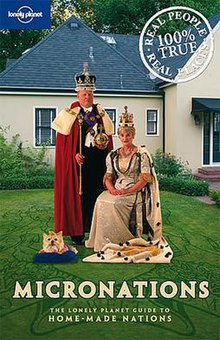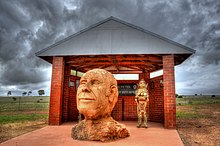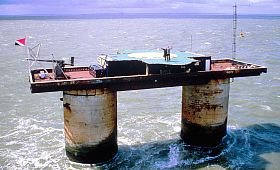
A micronation is a political entity whose representatives claim that they belong to an independent nation or sovereign state, but which lacks legal recognition by any sovereign state. Micronations are classified separately from de facto states and quasi-states; they are also not considered to be autonomous or self-governing as they lack the legal basis in international law for their existence. The activities of micronations are almost always trivial enough to be ignored rather than disputed by the established nations whose territory they claim—referred to in micronationalism as macronations. Several micronations have issued coins, flags, postage stamps, passports, medals and other state-related items, some as a source of revenue. Motivations for the creation of micronations include theoretical experimentation, political protest, artistic expression, personal entertainment and the conduct of criminal activity. The study of micronationalism is known as micropatriology or micropatrology.

The Principality of Sealand is a micronation on HM Fort Roughs, an offshore platform in the North Sea. It is situated on Rough Sands, a sandbar located approximately 11 kilometres (6 nmi) from the coast of Suffolk and 13 kilometres (7 nmi) from the coast of Essex. Roughs Tower is a Maunsell Sea Fort that was built by the British in international waters during World War II. Since 1967, the decommissioned Roughs Tower has been occupied and claimed as a sovereign state by the family and associates of Paddy Roy Bates. Bates seized Roughs Tower from a group of pirate radio broadcasters in 1967 with the intention of setting up his own station there. Bates and his associates have repelled incursions from vessels from rival pirate radio stations and the UK's Royal Navy using firearms and petrol bombs. In 1987, the United Kingdom extended its territorial waters to 12 nautical miles, which places the platform in British territory. As of August 2024, Sealand has only one permanent resident.

The Empire of Atlantium is a micronation and secular, pluralist progressive lobby group based in New South Wales, Australia.

The Gay and Lesbian Kingdom of the Coral Sea Islands was a putative micronation established as a symbolic political protest by a group of gay rights activists based in Australia. Declared in June 2004 in response to the introduction of a government bill to the Australian Parliament in May 2004 that codified the heterosexual definition of marriage, the Kingdom was founded on Australia's external overseas territory of the Coral Sea Islands, a group of uninhabited islets east of the Great Barrier Reef. The Kingdom was dissolved on 17 November 2017 following the "Yes" vote in the Australian Marriage Law Postal Survey legalising same-sex marriage.
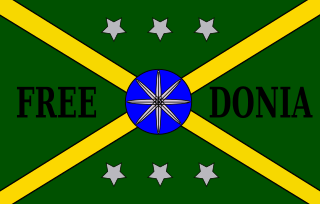
The Principality of Freedonia was a micronation based on libertarian principles. It was created as a "hypothetical project" by a group of teenagers in the United States in 1992. The project was formalized as a new country project in 1997, which included attempts in 2001 to lease territory in Somaliland. The attempt to lease land was rejected.
How To Start Your Own Country is a British six-part documentary comedy series aired between August and September 2005. The show was presented by British comedian Danny Wallace and followed his quest to start his own country in his flat in Bow, London. The micronation he created was eventually named "Kingdom of Lovely".

Molossia, officially the Republic of Molossia, is a micronation claiming sovereignty over 11.3 acres of land near Dayton, Nevada. The micronation has not received recognition from any of the 193 member states of the United Nations. It was founded by Kevin Baugh. He continues to pay property taxes on the land to Storey County, the recognized local government, although he calls it "foreign aid". He has stated, "We all want to think we have our own country, but you know the United States is a lot bigger".
Talossa, also known as the Kingdom of Talossa, is one of the earliest micronations – founded in 1979 by then-14-year-old Robert Ben Madison of Milwaukee and at first confined to his bedroom; he adopted the name after discovering that the word means "inside the house" in Finnish. Among the first such projects still maintained, it has kept up a web presence since 1995. Its internet and media exposure since the late 1990s contributed to the appearance of other subsequent internet micronations.

The Kingdom of Elleore is a micronation located on the island of Elleore in the Roskilde Fjord, north of Roskilde on the Danish island of Zealand.

Micronations are ephemeral, self-proclaimed entities that claim to be independent sovereign states, but which are not acknowledged as such by any recognised sovereign state, or by any supranational organisation. The constant reiteration of the flag as a symbol of a something that exists by the entity that it symbolizes confirms the validity of the flag as an officially sanctioned and/or definitive symbol of an entity; therefore, there has been a close association between vexillology/vexillogic imagination in creating visual symbols that appear to legitimize micronational claims.
The Kingdom of Vikesland was a micronation in Manitoba, Canada. It was founded in 2005 by Christopher Barry Joseph Beyette, a television news cameraman employed by the CHUM network.
MicroCon is a biennial summit or conference of micronationalists held in every other year since April 11, 2015. The event was created by Kevin Baugh of the Republic of Molossia, and every summit since has been hosted by a different micronation. MicroCon is a significant event in the micronational community, serving as a venue for exchanging ideas between micronationalists. The event has also been compared to the micronational equivalent of a session of the United Nations General Assembly. The largest edition, MicroCon 2019 in Hamilton, Ontario, Canada, had 113 attendees from 43 micronations. MicroCon 2023 was the first edition to consist of two separate events: an American summit in Joliet, Illinois, and a European summit in Ypres, Belgium.

The Principality of Snake Hill, also known simply as Snake Hill is a self-proclaimed independent sovereign state (micronation), located near Mudgee in New South Wales, Australia. Snake Hill has roughly hundreds of citizens, and claims land the size of Monaco. Snake Hill claimed independence on 2 September 2003, and Princess Paula claimed it was a right to secede, citing "The U.S., as you well know, seceded from England in 1776, It’s a remedial right, a last resort."

The Antarctic Micronational Union (AMU) is an intermicronational organization that aims to regulate micronational claims in Antarctica. The purpose of the AMU is to protect the claims of its members against other claimants.

Micronations and the Search for Sovereignty is a 2021 book by Australian constitutional law specialists Harry Hobbs and George Williams about micronations and their legal status. Written from an academic perspective, it is one of few works on micronational movements and the earliest-published book to focus largely on the legal aspect of micronations. The book concerns the definition of statehood, the place of micronations within international law, people's motivations for declaring them, the micronational community and the ways by which such entities mimic sovereign states. In 2022 Hobbs and Williams published a book for a broader audience, How to Rule Your Own Country: The Weird and Wonderful World of Micronations.
The International Micropatrological Society (IMS) was an American learned society and research institute dedicated to the study of micronations. Founded in 1973 by Frederick W. Lehmann IV of St. Louis, Missouri, the IMS coined micropatrology as the study of micronations and micronationalism. It had documented 128 micronations and similar political entities by 1976.

How to Rule Your Own Country: The Weird and Wonderful World of Micronations is a 2022 book by Australian lawyers and legal academics Harry Hobbs and George Williams about micronationalism—exploring several micronations and their motivations for declaring independence. The book gives an overview on the topic of micronationalism and explores numerous micronations, extant and defunct, as well as their motivations for declaring sovereignty. An overarching theme is the disproportionate number of micronations located within Australia. How to Rule Your Own Country is a follow-up to Hobbs' and Williams' more academic 2021 work Micronations and the Search for Sovereignty.
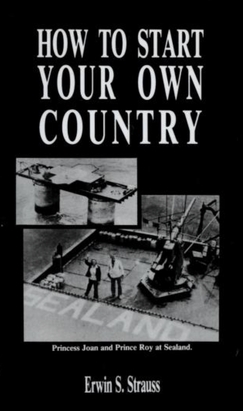
How to Start Your Own Country is an American non-fiction book written by Erwin S. Strauss about micronationalism, particularly its application to libertarianism and individualism. Strauss, who holds libertarian views, believes in the abolition of the power of the state. In How to Start Your Own Country, Strauss introduces five approaches that micronations may take in an attempt to achieve statehood, and documents various micronations and their mostly unsuccessful attempts at seceding. The first book published about micronations, How to Start Your Own Country was published in 1979, with subsequent editions in 1984 by Loompanics and in 1999 by Paladin Press. The book was well-received by critics.
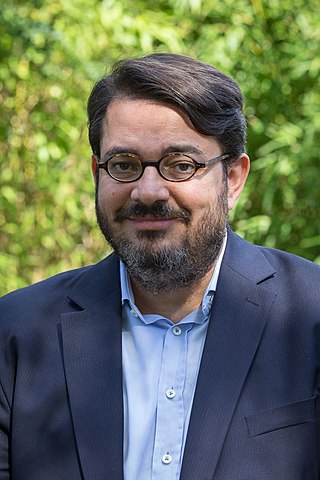
Although the academic study of micronations—known as micropatriology—is limited, there have nevertheless been a number of published works on the subject. The following is a list documenting these written works. This list does not contain works wherein micronationalism is the secondary theme, such as reference works which contain or make references to micronations and books about individual micronations.
